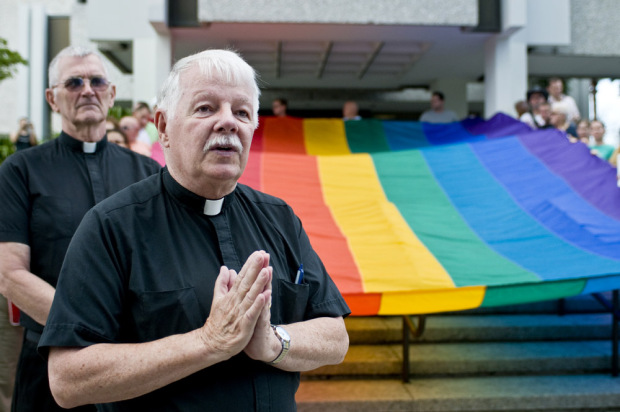
In October, Catholic bishops scrapped landmark plans by Pope Francis to welcome the gay community into the Catholic Church.
At the end of the two-week Vatican Synod on the Family, bishops simply referred to homosexuality as one of the problems Catholic families have to confront.
The synod’s initial first draft report spoke of ‘accepting and valuing their (homosexuals) sexual orientations’ and giving the gay community ‘a welcoming home.’
The final version however, eliminated those phrases that church progressives and equal rights groups had labelled as a breakthrough and instead, vaguely suggested that discrimination against homosexuals ‘is to be avoided.’
Gay rights groups, rightly so, expressed deep disappointment with the final vote.
Brain Sheehan of the Irish Gay and Lesbian Equality Network (GLEN) described the result as “a missed opportunity that the church didn’t seek to reflect the reality”.
Does this result symbolise yet another giant leap backwards for the Catholic Church? Worldwide media seem to think so, as coverage so far of the recent synod is laced with disapproval and discontent from gay rights advocates. But should we label it as such?
Yes, a considerable amount of bishops cling defiantly onto the conservative ways of the Catholic Church but isn’t this mind-set slowly changing?
What many news outlets failed to mention in their coverage of the synod is that the paragraph which expressed welcome toward the gay community fell only four votes short of the two-thirds majority needed for inclusion.
Four votes. Had the voting system been a simple ‘majority rules’ structure, it more than likely would have passed.
Surely this alone should be seen as a huge milestone for the Catholic Church and their rigid conservative mind-sets?
It is obvious that attitudes towards the gay community in Ireland are evolving. This change may not be not at the rate that we might prefer, but nevertheless it is change.
In a survey conducted by the Irish Examiner in September of this year it was found that 46 per cent of farmers in rural Ireland would vote in favour of a provision on same-sex marriage.
While it may have previously been accepted that a rural and perhaps socially conservative group like farmers would be inclined to oppose same – sex marriage, these findings prove that we can no longer assume so.
Change, especially an overhaul in a country’s attitudes as a whole, is not going to come about within a short time frame. Figures such as the above might be just baby steps in the long marathon in the attainment of equal rights for the LGBT community, but they at least mark progress.
Since Pope Francis’ election in March of last year, he has brought about the much needed platform for possible change within the Catholic Church.
He has openly admitted the failings of the Church with admirable frankness. He has encouraged tough questions to be answered and has brought about open discussion on issues such as gay rights, the rights of unmarried mothers and divorcees as well as publicly condemning Catholic bishops who covered up cases of child abuse.
More recently Pope Francis graciously accepted a rainbow scarf from
a top member of the European Parliament.
Ulrike Lunacek, head of delegation of the Austrian Green party, said she offered the Pope the present “for gays, lesbians, and for peace” during the European Parliament meeting in Strasbourg.
Lunacek is co-president of the European Parliament Intergroup on LGBT Rights, and is the first openly lesbian politician in the Australian Parliament.
While Pope Francis clearly still has a lot of convincing to do in order to win round his associates when it comes to the acceptance of LGBT people into the Church, perhaps the conclusion from the recent synod isn’t quite the detrimental setback it’s being made out to be.
Sharron Lynskey

Leave a Reply